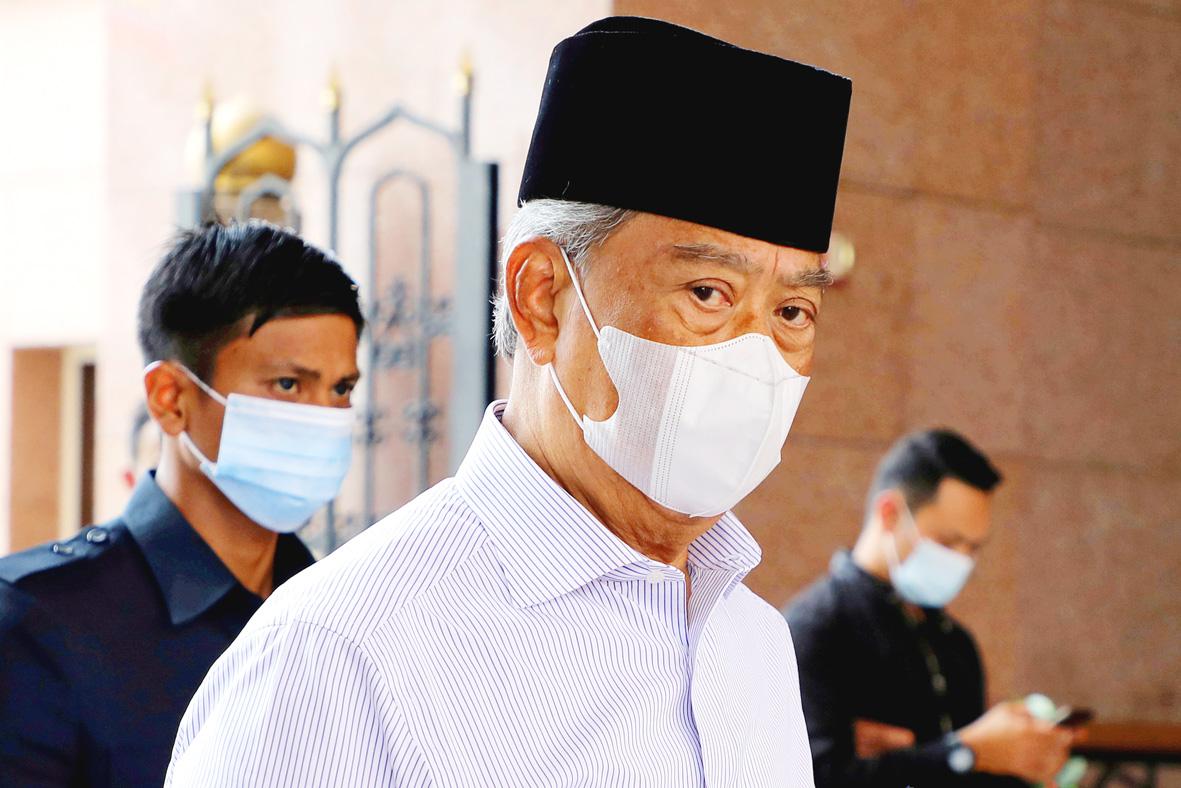Malaysian Prime Minister Muhyiddin Yassin yesterday faced calls to resign from both sides of the political aisle after the king rebuffed his proposal to call a COVID-19 state of emergency that critics saw as an undemocratic attempt to hold onto power.
Yassin’s proposal for the king to declare a state of emergency would have suspended parliament and let him dodge an imminent test of his support.
King Sultan Abdullah “is of the opinion that there is currently no need for His Majesty to declare a state of emergency in this country or any part of Malaysia,” the palace said on Sunday.

Photo: Reuters
Malaysia’s number of COVID-19 cases has doubled to 26,565 in just three weeks following a new outbreak, mainly in Sabah state on Borneo island.
Politicians from both sides of the divide, as well as legal and medical experts, have said an emergency declaration is unnecessary, and that there are sufficient laws to curb public movement and impose penalties to curb the outbreak.
Some have warned that declaring an emergency could ruin the economy and plunge Malaysia into a dictatorship. Emergency laws were last invoked nationally in 1969 during deadly racial riots.
The king in a statement said that the government has handled the pandemic well and he believed Muhyiddin was capable of coping with the crisis, though he also called for a halt to “all politicking” that could disrupt the government’s stability.
Muhyiddin hours later said that the Cabinet had noted the king’s decision and would further discuss the decree. Local media said that the Cabinet was expected to meet later yesterday.
“The priority of the Cabinet and the government at this time is to protect citizens from the COVID-19 disease,” Muhyiddin said in a statement.
He also welcomed the king’s advice to ensure political stability.
Muhyiddin took power in March, but holds only a two-seat majority in parliament. Opposition leader Anwar Ibrahim says that he has majority support, but needs the king’s approval to form a new government, and the biggest party in the ruling coalition is angry about being sidelined in Muhyiddin’s government.
A key test comes early next month when the government is due to seek approval for next year’s budget in parliament.
If Muhyiddin is unable to pass the bill, pressure would build for him to resign or call new elections.
A state of emergency could allow him to approve the budget without a vote and consolidate his support, and he could govern through ordinances that could not be challenged in court.
“In whatever way you look at it, indications are that the PM has realized that he has effectively lost his majority,” said Ahmad Fauzi Abdul Hamid, political science professor at Malaysia’s University of Science.
Despite the king’s rejection of the call for a state of emergency, his endorsement of Muhyiddin’s government could offer a reprieve and help the prime minister get the budget bill passed.

‘TERRORIST ATTACK’: The convoy of Brigadier General Hamdi Shukri resulted in the ‘martyrdom of five of our armed forces,’ the Presidential Leadership Council said A blast targeting the convoy of a Saudi Arabian-backed armed group killed five in Yemen’s southern city of Aden and injured the commander of the government-allied unit, officials said on Wednesday. “The treacherous terrorist attack targeting the convoy of Brigadier General Hamdi Shukri, commander of the Second Giants Brigade, resulted in the martyrdom of five of our armed forces heroes and the injury of three others,” Yemen’s Saudi Arabia-backed Presidential Leadership Council said in a statement published by Yemeni news agency Saba. A security source told reporters that a car bomb on the side of the road in the Ja’awla area in

PRECARIOUS RELATIONS: Commentators in Saudi Arabia accuse the UAE of growing too bold, backing forces at odds with Saudi interests in various conflicts A Saudi Arabian media campaign targeting the United Arab Emirates (UAE) has deepened the Gulf’s worst row in years, stoking fears of a damaging fall-out in the financial heart of the Middle East. Fiery accusations of rights abuses and betrayal have circulated for weeks in state-run and social media after a brief conflict in Yemen, where Saudi airstrikes quelled an offensive by UAE-backed separatists. The United Arab Emirates is “investing in chaos and supporting secessionists” from Libya to Yemen and the Horn of Africa, Saudi Arabia’s al-Ekhbariya TV charged in a report this week. Such invective has been unheard of

US President Donald Trump on Saturday warned Canada that if it concludes a trade deal with China, he would impose a 100 percent tariff on all goods coming over the border. Relations between the US and its northern neighbor have been rocky since Trump returned to the White House a year ago, with spats over trade and Canadian Prime Minister Mark Carney decrying a “rupture” in the US-led global order. During a visit to Beijing earlier this month, Carney hailed a “new strategic partnership” with China that resulted in a “preliminary, but landmark trade agreement” to reduce tariffs — but

SCAM CLAMPDOWN: About 130 South Korean scam suspects have been sent home since October last year, and 60 more are still waiting for repatriation Dozens of South Koreans allegedly involved in online scams in Cambodia were yesterday returned to South Korea to face investigations in what was the largest group repatriation of Korean criminal suspects from abroad. The 73 South Korean suspects allegedly scammed fellow Koreans out of 48.6 billion won (US$33 million), South Korea said. Upon arrival in South Korea’s Incheon International Airport aboard a chartered plane, the suspects — 65 men and eight women — were sent to police stations. Local TV footage showed the suspects, in handcuffs and wearing masks, being escorted by police officers and boarding buses. They were among about 260 South